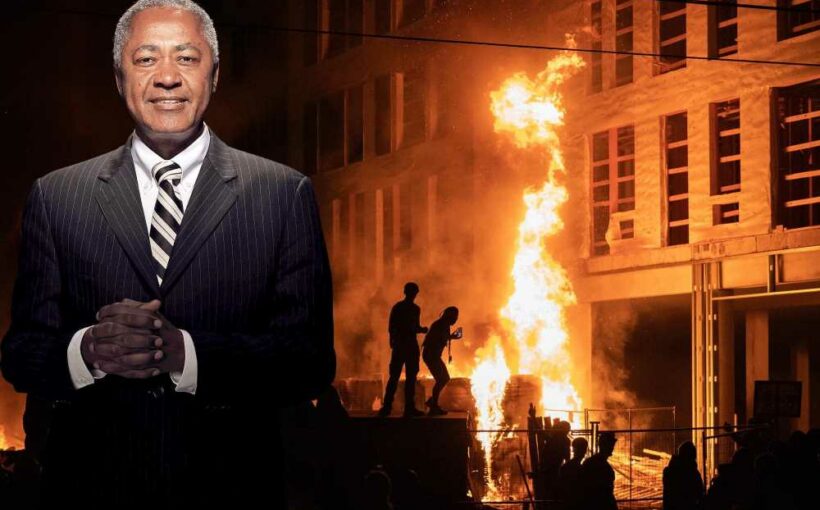More On:
minneapolis
What to expect at Derek Chauvin’s sentencing for murder of George Floyd
Child scolds school board about BLM posters in school despite ‘no politics’ rule
Minnesota prosecutor felt ‘a little bad’ for Derek Chauvin after murder conviction
Prosecutors ask judge to reject Derek Chauvin retrial bid
Don Samuels, 72, is an American success story. Born in Jamaica, he moved to the United States 52 years ago. He has since built a prosperous life as a designer, eventually settling in Minneapolis, inventing and creating toys for major manufacturers. He became a member of the Minneapolis City Council, where he served during 2003 to 2014, and even ran for mayor in 2013.
So, last year, he was shocked to see his city go up in flames after the murder of George Floyd in Minneapolis police custody. While many peaceful protests erupted on the streets, so did violent riots that left some neighborhoods looted and burned. As anti-cop sentiment grew, the Minneapolis City Council voted to dismantle the city’s police force, slashing $8 million from its budget and diverting it to other services.
Samuels said he and his wife Sondra were stunned by the council’s move.
“They just thought, ‘Get rid of police and the world would be great.’ My wife and I look at each other and go like, ‘Oh, my God, it’s going to be crazy around here.’ ”
Their fears of a hamstrung police department giving rise to emboldened criminals sadly came true.
Last year marked the second deadliest in the city’s history (after only 1995, when it was notoriously dubbed “Murderapolis”). In 2021, from January 1 to July 1, homicides have risen even higher — up 34 percent compared to the same time frame in 2020. Several children have been killed by gunfire in recent weeks, including a 6-year-old girl riding in a car, a 9-year-old girl jumping on a trampoline at a friend’s birthday party, and another 6-year-old girl eating a McDonald’s Happy Meal while returning home in her mom’s car.
Crime has always been a problem in certain neighborhoods, but stories of horrific violence are no longer aberrational in the city, Samuels said, particularly in his area of North Minneapolis.
The home of one family he knows “has two bullet holes, one in the front door and one in their daughter’s bedroom wall.” Last summer, gang members were “shooting at each other across a field of 50 elementary school children practicing peewee football,” he said. The coaches and the parents had “to dive on them to cover them up,” he said.
After many Minneapolis cops retired, quit or went on extended medical leave (predominantly from PTSD) last summer, the city’s department is now short more than 200 officers from its state-mandated 889. The understaffing has led to a drop in police vigilance: Cops have made about 400 violent-crime arrests so far this year, down 30 percent from 600 over the same time period last year.
“I have a neighbor who called 911 to say she was bringing her groceries in from the car and there were guys getting into her car because it was open to drive off,” Samuels said. “She called and she’s explaining this to the 911 operator and they say, ‘We don’t have anybody.’ ”
Late last year, Samuels and his wife, along with their neighbors, finally took action by filing a lawsuit against the city for failing to provide the minimum number of police officers per citizen in Minneapolis. On July 1, a judge ruled in their favor, ordering the Minneapolis Police Department to hire more officers. The department is now required to staff at least 730 officers by June 30, 2022, or .0017 sworn officers per resident.
The city council has also reversed its original decision to defund the police, approving $6.4 million in additional funding that the department requested to hire and train more cops.
“We are still a long way from the 888 [officers] that used to be our goal,” Samuels said. “But it will be a big improvement, by about 80, from where we are today. At least the council will not continue its defund strategy.”
Samuels said he is satisfied that people like him — minorities living in neighborhoods where violence escalated amid anti-police sentiment — are finally being heard.
“We are thrilled that the voices in the most ignored quadrant prevailed against a national movement of naïveté,” he said. “A black life matters when taken by cops and each black life matters when lost to community violence. We deserve community services, affordable housing and a decent relationship with police. And we most certainly deserve to live.”
Rav Arora is a columnist based in Vancouver, BC, focusing on crime, race and culture.
Share this article:
Source: Read Full Article



